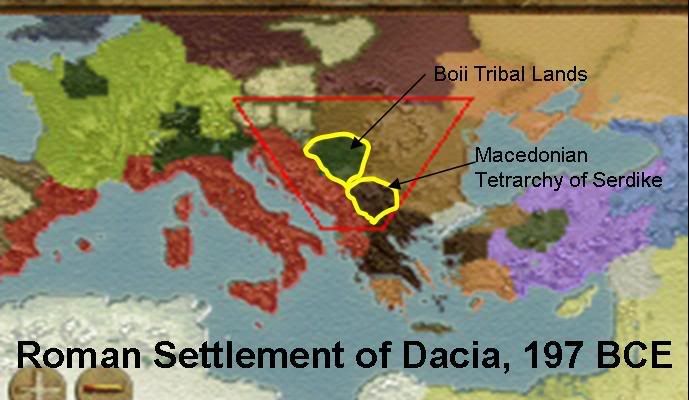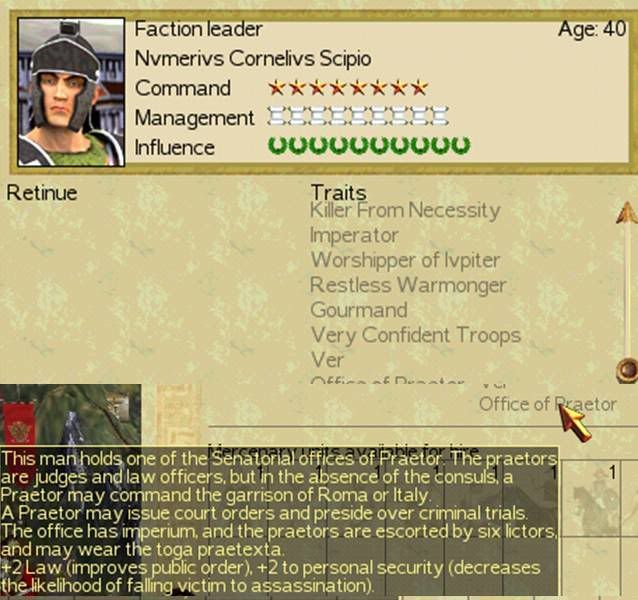PRIMVS INTER PARES:
Part III
Numerius Julius Caesar prosecuted the Dacian War until its bitter completion, using a strategy of sacking and burning cities while starving their inhabitants to force the ambitious barbarian King to come to the negotiation table. Romans, however, do not negotiate---they dictate terms. In 197 BCE King Zusivada accepted the now undeniable, that his feeble tribal forces,un-united and dispersed, could not withstand the effectiveness of a centralized and well equipped Roman military machine. In the Treaty of Segestica, Winter, 196, the Dacians accepted their fate, and Caesar presided over the surrender of arms and banners from the Dacian chieftans.
As part of the terms of the agreement, the Getae would pay Rome an annual indemnity of 1,000 talents worth in gold, and land conquered by Zusivada would be redestributed to form buffer states around the warlike clans. As such, Serdike was handed over to Macedonian power, and his eastern lands added to the lands of the Boii kingdom.
The Dacians were defeated, but as a result of this harsh treatment would harbor a festering resentment for the ascendant Republic which would haunt them in the future. King Zusivada would die an old, broken man, but his sons would live on with a hatred of the Sons of Romulus.
 POLITICS IN ROME AND TROUBLE IN HISPANIA
POLITICS IN ROME AND TROUBLE IN HISPANIA
197 through 194 were quiet years overall, in Rome business much as usual went on. Numverius Julius Caesar returned from Dacia a conquering hero, but once the accolades and triumphs were completed, retreated to a more contenmplative life of scholarship and oratory. He was undoubtedly one of the most august leaders of the Senate, and turned his attentions to more political pursuits and effective legislation. Often among his closest friends he would claim he was weary of war and battle, and had seen too many men killed and others wounded horribly.
Caesar brought on an orator and author to his household, Quintus Fabius Pictor, whom he sponsored to write histories in Latin and Greek of both the Punic Wars and the Dacian Conquest, both of which were quite favorable to the character of Numerius Caesar, of course.
In 194 BCE, Caesar was elected as Senior Consul for the year, while his rival Numerius Cornelius Scipio, whom had satisfied his warlike urges chasing Gallic bandits in the north for the past year, was finally accpted into the Praetorship.


 The Roman World in 194 BCE
The Roman World in 194 BCE
THE SECOND MACEDONIAN WAR, 194--190 BCE
The King of Macedon had long coveted the lands of his southern neighbors, and intermittent warfare had plauged Achaea for decades. Again, in 195, the Macedonians renewed their war on Greece, marching into the Peloponnesos with an army some 100,000 strong and capturing both Athens and Corinth in one summer.
The Senate was loathe to act in this matter, as the Dacian war had just concluded and no one was eager for another long confrontation, except the young magistrates eager for glory. Numerius Caesar gave an impassioned speech in the Senate house on Rome's involvement in foreign affairs that had nothing to do with her or its people, and claimed that Rome herself had created most of these situations by meddling in other nations' politics.
Most of the Optimates would have nothing to do with such speech, and Caesar was shouted down. His old rival, Numerius Cornelius, responded in kind, not only in the Senate itself but later in the Forum. The cities of Greece had long ago turned to Rome for alliance and assisstance against their northern aggressors, he reminded the people. The Hellenic city-states paid tribute to Rome, and saw Rome as their protector. How could Rome now abandon them? And so, with his allied Tribunes called a meeting of the Comitia Centuriata, Scipo was granted command of an army by popular acclamation, his mission to invade Macedonia, and restore freedom to the oppressed Greeks.
With a quaestor and 12 tribunes at the head of an army of two seasoned legions fresh from the Dacian wars, Scipio disembarked from Brindisi on 12 May 194, BCE.

The Arcadian Campaign was the first and probably most decisive battle of the war, in which the Macedonian puppet Astrabakos, tetrarch of the Peloponessos, brought his army of mercenaries and foreigners to oppose the landing of Scipio and the Republic. Scipio turned the phalanx upon itself and routed the Anatolian mercenaries in a crushing defeat for the Macedonian aggressors. It is then, historians believe, after the victory, that Scipio's agents purchased some of the captured Macedonian officers...
Scipio won victories one after the other for the next four years. First Corinth fell after a protracted siege. Then Athens, from treachery within its walls. The army crossed and moved upon Demetrias, storming it after two months and slaughtering the Macedonian garrison who would not surrender. In 190, with the Macedonian armies that remained stuck in Asia Minor, and the path to Pella open before Scipio's veteran legions, the King of Macedon opened peace talks.
Scipio demanded full subservience from the mere King, for he was a Praetor of Rome. In a humiliating treaty, Macedon was required to disband most of its armies, return its captured lands to their proper Hellenic natives, take apart its amassed navy, and pay indemnities to the Roman Republic. Furthermore, Macedonia was not permitted to make war outside its borders without explicit approval by the Senate of Rome. Essentially, the Kingdom of Alexander was made a client state of Rome.



My red balloons, as red as the blood of he who mentioned Galatians.

... and I'm in the purple! )
Bookmarks